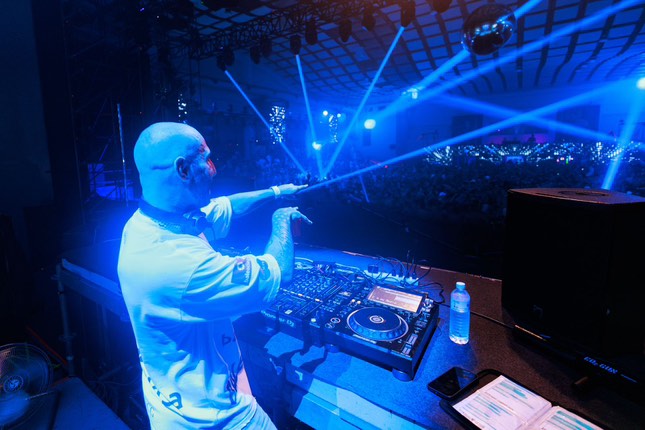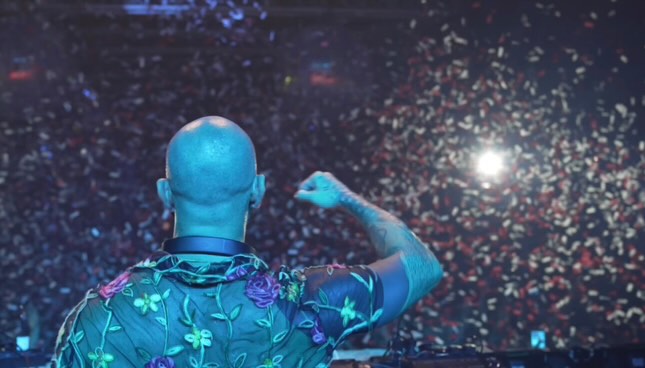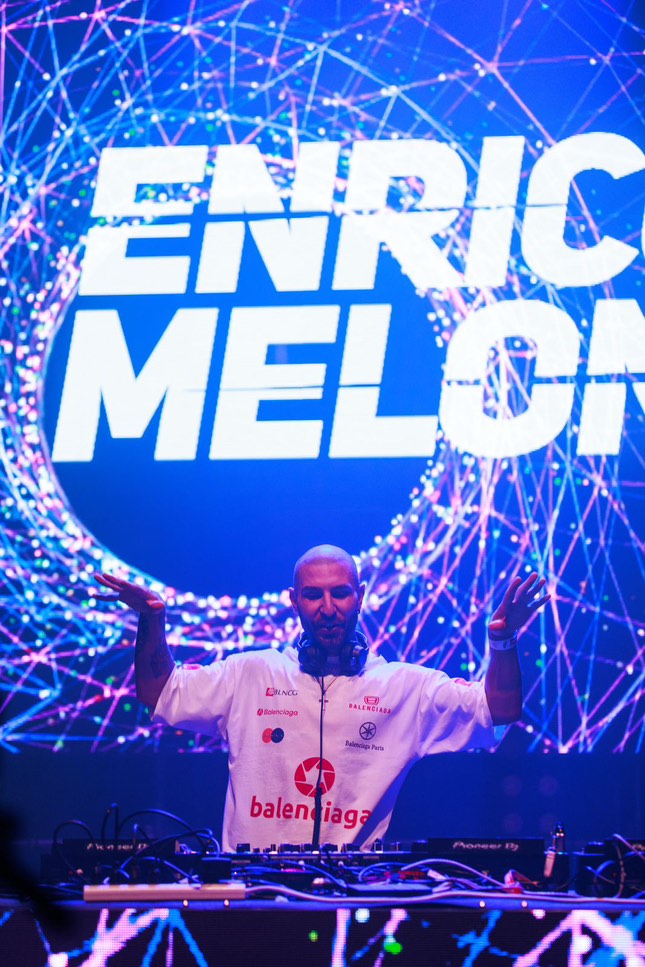Enrico Meloni: The Italian DJ Who Became a Global LGBTQIA+ Icon
An exclusive conversation with Enrico Meloni, the Italian DJ who transcends borders with his unique fusion of tribal, progressive, and Latin house, inspiring the global LGBTQIA+ scene.
Charismatic, passionate, and intense, Enrico Meloni is more than a DJ — he is a global force in the LGBTQIA+ electronic music scene. Born in Italy and celebrated across the world, he has built a career that radiates diversity, freedom, and a genuine connection with his audience. His unmistakable fusion of tribal house, progressive beats, and Latin rhythms has captivated fans on the most iconic dance floors — from circuit parties to major festivals, always leaving his vibrant sonic signature.
With a magnetic presence and emotionally charged sets, Enrico goes beyond music — he creates experiences. Each performance is a celebration of the queer community and a manifesto of belonging, acceptance, and pride. Beyond the decks, his authenticity on social media, passion for cooking, and commitment to his art reveal a well-rounded artist who inspires both on and off the stage.
In this exclusive interview for Cultura Queer and Radio Power Strike, Enrico Meloni shares his influences, unforgettable moments, views on representation, and the challenges of reinventing himself in an ever-evolving industry. Get ready to dive into the mind and heart of one of the most iconic DJs on the global LGBTQIA+ scene.
Exclusive Interview with Enrico Meloni

Your journey in music started early, and since then, you’ve built a solid career as a DJ. What were the key moments in your early days in the electronic scene? How did those experiences help shape your musical style and approach to performing?
Since I was a child, I’ve been fascinated by music and its power to bring people together. One of the key moments in my career was when I started playing at my first LGBTQIA+ events and circuit parties. The energy of the crowd, the freedom of expression, and the connection that formed on the dancefloor made me realize that it wasn’t just about playing records, but about creating experiences. Traveling also played a fundamental role, every city where I performed left a mark on me, influencing my sound and the way I build my sets.
Your musical style is a fusion of tribal house, progressive house, and Latin influences, creating a unique sonic identity. How did you develop this signature sound over the years, and what pivotal moments in your career helped define it?
My sound emerged from a mix of different passions and influences. I’ve always loved tribal and Latin rhythms, the depth of progressive house, and the energy of powerful vocals. Over time, I experimented a lot, trying to create a sonic identity that is both recognizable and constantly evolving. A decisive moment was when I started producing my own music and testing it in my sets, this helped me understand what worked best with the audience and how I could make each track truly personal.
A DJ’s energy can completely transform the atmosphere of an event. Do you recall a specific moment when you felt a deep, almost electric connection with the crowd? How did that experience shape your perspective on the power of music in people’s lives?
There have been many moments like this, but one in particular stands out. It was an open-air festival, the night was perfect, and I remember playing a track with a very emotional drop. At that moment, I saw hands rise in unison, faces light up, and the energy turn into pure euphoria. That was when I truly realized how music is a universal language, one that makes people forget everything else and connects them in a shared experience.
Circuit parties are more than just music – they provide a space for community, belonging, and celebration for the LGBTQIA+ audience. In your opinion, what impact do these events have in promoting diversity within electronic culture and fostering more inclusive spaces?
Circuit parties are not just music events, they are places of expression, liberation, and community. They offer a space where everyone can be themselves without fear of judgment, and that has immense value. Electronic music was born from marginalized communities, and today, it continues to be a platform for promoting inclusion and diversity. It’s important that these events remain accessible and continue to celebrate LGBTQIA+ culture in all its forms.
Beyond music, we know you have a passion for cooking and are even known for making an authentic pasta carbonara. Do you see any similarities between crafting a great dish and building an immersive DJ set? Do you feel that your love for cooking somehow reflects your artistic creativity?
Absolutely! Both music and cooking are sensory experiences. Creating a DJ set is like preparing a dish, it requires balance, contrast, and the right timing for every ingredient. You can’t start with an explosion of flavors or sounds, you have to build gradually, playing with expectations. And just like in music, in cooking, there’s always that element of surprise that makes the experience unique.
A DJ’s career demands constant adaptation to industry shifts and new trends. What have been the biggest challenges you’ve faced so far, and what strategies have you used to reinvent yourself and stay relevant in the electronic music scene?
One of the biggest shifts has been the role of social media and digital platforms. Today, being a great DJ isn’t enough, you also need to know how to communicate, create content, and stay connected with your audience. The challenge is maintaining an authentic identity without blindly following trends. To stay relevant, I constantly update myself, experiment with new sounds, and always strive to bring something personal to my sets and productions.
Throughout your journey, you’ve performed at numerous clubs and festivals around the world. Is there a particular performance that stands out as especially meaningful to you? Can you share a bit about that experience and what made it so special?
Every event has something special, but one of the most significant moments was opening for Lady Gaga at Europride in Rome, in the stunning setting of the Circus Maximus. Playing in front of thousands of people, feeling the collective energy, and seeing the audience react to my music was an indescribable emotion. That was the moment I knew I was truly doing what I loved.
With the rise of technology, digital platforms have become essential for artists to expand their reach and maintain a direct connection with fans. How have you leveraged these tools to promote your work and ensure your music reaches new audiences?
Social media and streaming platforms are essential tools for a DJ today. I use them not only to promote my tracks and sets but also to share my world, give behind-the-scenes glimpses, and create a dialogue with my audience. It’s a way to bring my music to those who haven’t yet had the chance to hear me live.

Many aspiring DJs struggle to find their unique style and stand out in a competitive market. What advice would you give to those just starting out who want to build a solid career in electronic music?
The main advice is to be authentic. Don’t try to imitate someone else or follow a trend just because it’s popular. Listen to everything, experiment, and find the sound that truly represents you. And most importantly, be consistent, building a career takes time, dedication, and a lot of passion.
In recent years, the LGBTQIA+ electronic scene has grown significantly, gaining more recognition globally. How do you see this evolution, and what role do you believe DJs play in creating safer, more welcoming, and representative spaces for the community?
The LGBTQIA+ electronic scene is constantly growing, and it’s amazing to see more events and festivals giving space to this community. DJs play a fundamental role, we’re not just entertainers, we create atmospheres, send messages, and shape safe spaces through music. We can give visibility to queer talent, promote messages of inclusion, and use our platform to support the community.
For the international listeners of Radio Power Strike and the Brazilian audience of Cultura Queer who follow your work, what message would you like to share with them?
I absolutely love Brazil. The moment I land, I feel an incredible energy take over me, as if all my worries fade away. I have a deep connection with this country, but I also believe that, in general, Italy and Brazil share a special bond. There is something about the Brazilian spirit, the way people live music, dance, and celebrate life, that truly resonates with me. Every time I return, I feel at home.

Enrico Meloni is far more than just a DJ — he is an artist who proudly embodies the strength of the global LGBTQIA+ electronic scene. With talent, sensitivity, and a genuine connection to his audience, he has turned his passion into a movement that crosses borders and celebrates diversity with intensity.
From major European festivals to the dance floors of Brazil, his music unites, moves, and inspires. Enrico proves that authenticity, dedication, and love for the craft are still the most powerful ingredients to conquer the world. His journey is not only a story of success, but a living tribute to the power of queer music to transform lives — both on and off the dance floor.
Follow Enrico Meloni on social media:
Instagram: @enricomeloniofficial
Facebook: Enrico Meloni DJ
YouTube: Enrico Meloni
DJ Sessions: SoundCloud – DJ Sets & Live Sessions

Comments are closed, but trackbacks and pingbacks are open.